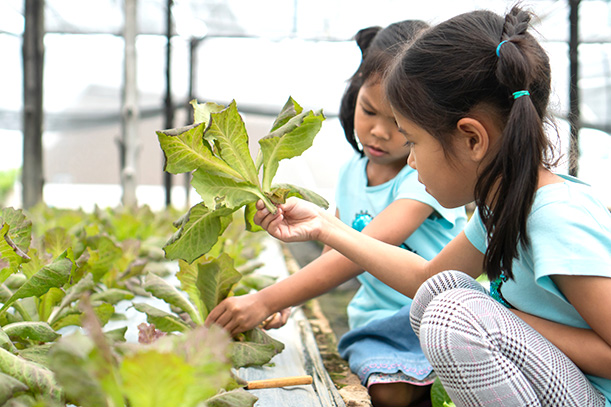BOOMbox at Home: Urban Farming and Hydroponics
September 3, 2020

Ever wonder where your food comes from? When most people think of farming, they imagine large fields far away, but today we’re going to look at some of the amazing things you can grow in Skokie. From food to flowers, there’s a seed of inspiration for everyone.
Hydroponics How-To
No soil? No problem! Hydroponics uses a nutrient solution and water in place of soil for growing plants. You can actually see the roots of your plants grow. Learn how to create a hydroponic system using a straw. Because it’s so small and uses primarily materials you likely have on hand, it’s a great place to get started. When you’re ready for more, try this slightly more complex two-liter bottle garden from Epic Gardening. This project allows for a larger plant and can be a great jumping off point for learning more about the science of gardening, like how water pH can affect the health of your plants.
Grow Your Own Salad
You can reuse the plastic containers from the veggies you bought at the store as pots for growing your own greens, including herbs and some produce, in your own kitchen. And reusing doesn’t have to stop at the containers. You can also use the scraps and seeds from your food to start new plants. Some will grow more quickly than others, but whether you end up with a food source or a fragrant house plant, planting your scraps is a great way to turn trash into treasure. Read more about kitchen scrap gardening to grow citrus, sweet potatoes, carrots, avocados, onions, and more.
Wildflowers and Worms
Food isn’t the only thing urban farmers are reimagining. Seed bombs are a fun and inventive way to plant flowers. Using just seeds, compost, and cooking flour, you can make seed bombs that are easy to scatter. Don’t forget to get permission before planting. Learn more about how to prep seed bombs at Craft Invaders.
Seeds and flour are fairly easy to find, but you may be wondering where to get compost. Did you know that you can make your own at home? Composting doesn’t just help plants grow; it also helps the planet. Watch a TedEd video about vermicomposting, a composting method using worms that can help reduce waste. And the Environmental Protection Agency has instructions on how to make an inexpensive vermicomposter for your home.
Scientist of the Week
Kemyah Durden is a cofounder of the Rid-All Green partnership, an urban farming organization that works to provide access to healthy food to Black and Latinx communities in Cleveland. Durden originally studied avionic-mechanical engineering and construction, and he currently works in public relations, urban agriculture, and community engagement. He is involved in programs promoting fresh water, sustainability, and healthy lifestyles across the world.
Share
We’d love to see the results of your experiments! Tag @skokielibrary when you share photos of what you’ve created on social media.
Written by Eli.